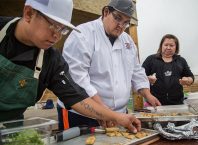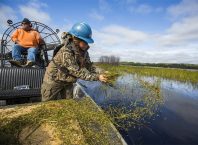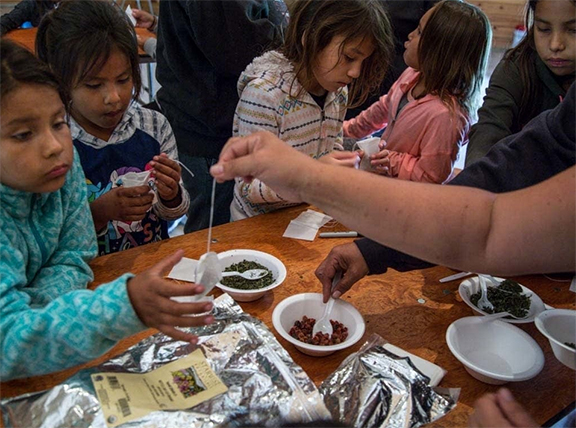
By John Enger/MPR News
All Photos by Monika Lawrence/MPR News
The Red Lake Band of Chippewa held its sixth annual Ojibwe Language camp in late July. Kids from all across the reservation gathered in the remote backwoods of Ponemah to learn about plant medicines, and language and traditional native lacrosse. Or at least, to try and pelt their lacrosse teacher, Kelly Iceman Sr., with tennis balls. Iceman is a fast runner, and only of few balls connected.
“I’m 44,” he said. “But I play hard. Even against the little ones. That’s how they learn.”
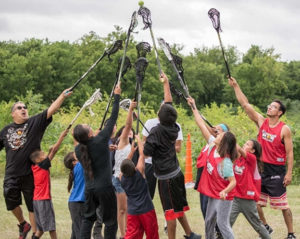
Dodging a hailstorm of tennis balls wasn’t actually part of the game, Iceman explained. It was a demonstration of toughness, to get the kids to stop whining.
“Let me ask you this,” he asked a group of kids. “Who complained today? Who cried?”
The kids all shake their heads. No one complained. No one cried.
Lacrosse has its roots in native culture, but its reputation has been gentrified by white suburban kids, at Ivy League schools. Iceman said the game was nearly lost to its people.
He led a group of kids to his van and pulled out a duffel bag of traditional ash lacrosse sticks. Instead of the larger modern scoops, they have a steam bent circle at the end.
“I only started playing two years ago,” he said. “I had to learn how to make all this stuff.”
Iceman is trying to bring back the old game. That’s the whole point of the camp – to bring back the culture. Over three days in the woods of Ponemah, local elders teach kids how to make mosquito repellent from plants, how to wrap drumsticks, and how to pronounce simple phrases in the Ojibwe language.
Nate Taylor heads up the camp, as well as the tribe’s fledgling Ojibwe immersion school. He said it was the language which got the camp started in the first place.
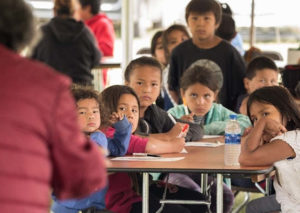
“We knew we had to do something about the language,” he said. “But what can we do? How do you get community buy-in?”
Taylor said that about six years ago, Red Lake was on the brink of losing its language. Just a few more than 100 elders were still fluent, and that number was shrinking by the year.
The old language, he said, didn’t just fade away. It was beaten out of an entire generation.
One of Taylor’s best teachers at the immersion school is Elizabeth Kingbird. She’s 84 and a native Ojibwe speaker, but she couldn’t always be open about it.
“When I went to school, we couldn’t talk the language,” she said. “We got beat. They beat us. They were very mean to us.”
It’s a common story on the reservation. Clifford Hardy, 72, said he started first grade with no grasp of the English language. He had no idea what was going on, but every time he spoke in Ojibwe the principal beat him with a yardstick. He learned English fast.
Taylor said that most people like Kingbird and Hardy didn’t pass on the language. They didn’t want their children to go through the same treatment.
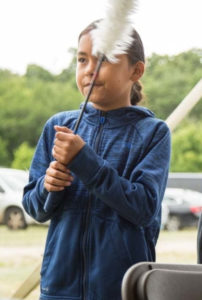
But there was one small, remote village where the language wasn’t lost: Ponemah.
“The cool thing about where you’re standing is that it’s an unbroken line of our cultures, our traditions and our way of life,” explained newly elected tribal secretary Sam Strong. “Never have we ceded control of this land. Never have we stopped practicing our traditions and our way of life. And that’s unique.”
Strong helped establish the camp six years ago. He said Ponemah is special partly because it’s so isolated. The village is built on a small point of land between upper and lower Red Lake. There’s just one road in.
The people there still bury their dead family members in the front yard, and build small shelters above the graves, just as they have for centuries. They’ve held doggedly to their beliefs and language. Those 100 fluent elders – just about all of them come from Ponemah.
If there’s any place where young people can plug back into their culture, Strong said, it’s Ponemah.
Minnesota Public Radio News can be heard on MPR’s statewide radio network or online.



